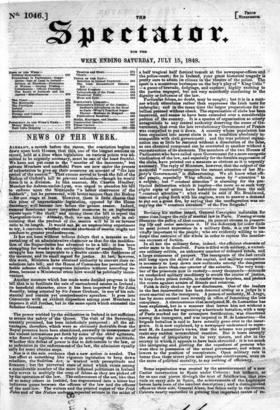NEWS OF THE WEEK.
ALREADY, a month before the recess, the conviction begins to dawn upon both Houses, that this, one of the longest sessions on record, held at a time when legislation on various points was ad- mitted to be urgently necessary, must be one of the least fruitful. We have not yet come to the "murder of the innocents," but private Members and unofficial Peers are now under the process of exhortation to give up their measures on account of "the late period of the session." That excuse served to break the fall of the Bishop of Oxford's bill to prevent seduction—though he would force it to a division. In like manner, Mr. Charles Hindley, Member for Ashton-under-Lyne, was urged to abandon his bill to enforce upon the Metropolis "a better observance of the Sabbath" ; but he persevered, with better success than the Bishop —for one stage at least. However, there is little chance that this piece of impracticable legislation, opposed by the Home Secretary, will become law before the grouse season. Indeed, rumour foredooms more important measures to an inglorious repose upon "the shelf," and among them the bill to repeal the Navigation-laws. Already, then, we are tolerably safe in cal- culating that the produce of the session will be in an inverse ratio to its length. It would not Ise an unpromising experiment to try, 6 converao, whether extreme shortness of session might not conduce to greater productiveness.
It has not been without tedious delays that a measure so far partaking of an administrative character as that for the modifica- tion of the Sugar-duties has advanced to be a bill : it has been struggling for weeks in the embryonic form of resolutions. The struggle has been imputable to a double cause—the feebleness of the measure, and its small regard for justice. At last, however, this week, Ministers have obtained authority to convert their re- solutions into bill; and the House of Commons has permitted the feeble scheme which recognizes injustice without according re- dress, because a Ministerial crisis here would be politically incon- venient.
Another measure which has made some decided progress is the bill that is to facilitate the sale of encumbered estates in Ireland ; its beneficial character, since it has been improved by Sir John Romilly, being attested by Sir James Graham, in one of his sub- stantial and concise yet comprehensive speeches. It goes into Committee with an evident disposition among most Members to improve it still further, but in the same spirit which animated the Solicitor .General


























